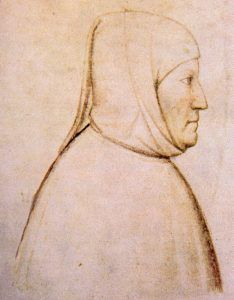Charles Nicholl at the LRB:
 Complexities of interpretation are food and drink to Petrarchan scholars, and Christopher Celenza tucks into them with quiet determination in his short life-and-works overview, Petrarch: Everywhere a Wanderer. The subtitle is taken from one of Petrarch’s verse letters, where he describes himself as ‘peregrinus ubique’ (more precisely translated as ‘everywhere a pilgrim’). He was indeed a restless traveller. We find him in Avignon, Montpellier, Lombez, Paris, Ghent, Liège, Basel and Prague, as well as all over Italy. A learned marginalium suddenly becomes a snapshot when he apologises for his handwriting – he’s writing while on a boat. But the peregrination he describes is more a metaphysical restlessness, as he moves among different interests, disciplines, languages and political allegiances; between different versions of himself – a man of no fixed abode, ‘without earth or sky to call his own’. This also has a bearing on exile. His father was of the conservative or ‘white’ wing of the Guelph party, whose members opposed papal influence, and (like Dante, whom he knew) had been banished from Florence in 1302; Petrarch was born two years later in Arezzo and spent his boyhood and youth in Provence. ‘A sense of exile,’ Celenza says, ‘permeated Petrarch’s psychology’ and ‘inflected his writing’. It also, paradoxically, fostered in him an early sense of ‘Italianness’, in place of the regional identity denied him by exile.
Complexities of interpretation are food and drink to Petrarchan scholars, and Christopher Celenza tucks into them with quiet determination in his short life-and-works overview, Petrarch: Everywhere a Wanderer. The subtitle is taken from one of Petrarch’s verse letters, where he describes himself as ‘peregrinus ubique’ (more precisely translated as ‘everywhere a pilgrim’). He was indeed a restless traveller. We find him in Avignon, Montpellier, Lombez, Paris, Ghent, Liège, Basel and Prague, as well as all over Italy. A learned marginalium suddenly becomes a snapshot when he apologises for his handwriting – he’s writing while on a boat. But the peregrination he describes is more a metaphysical restlessness, as he moves among different interests, disciplines, languages and political allegiances; between different versions of himself – a man of no fixed abode, ‘without earth or sky to call his own’. This also has a bearing on exile. His father was of the conservative or ‘white’ wing of the Guelph party, whose members opposed papal influence, and (like Dante, whom he knew) had been banished from Florence in 1302; Petrarch was born two years later in Arezzo and spent his boyhood and youth in Provence. ‘A sense of exile,’ Celenza says, ‘permeated Petrarch’s psychology’ and ‘inflected his writing’. It also, paradoxically, fostered in him an early sense of ‘Italianness’, in place of the regional identity denied him by exile.
more here.
